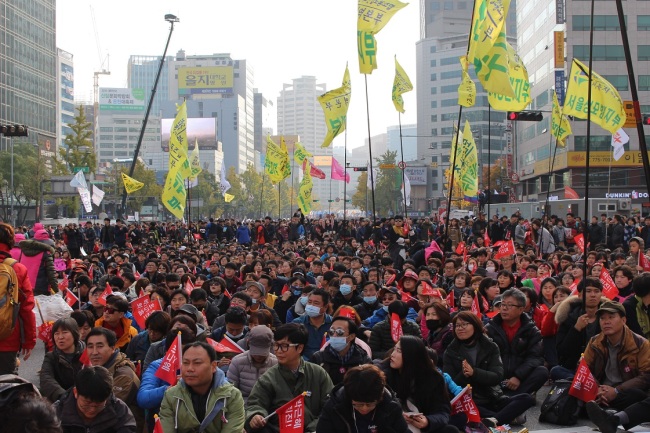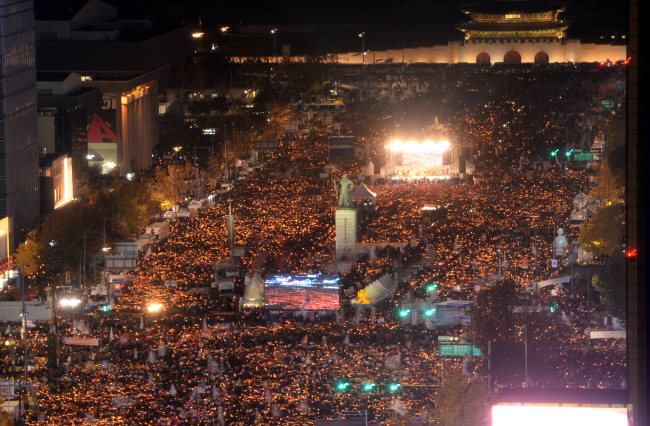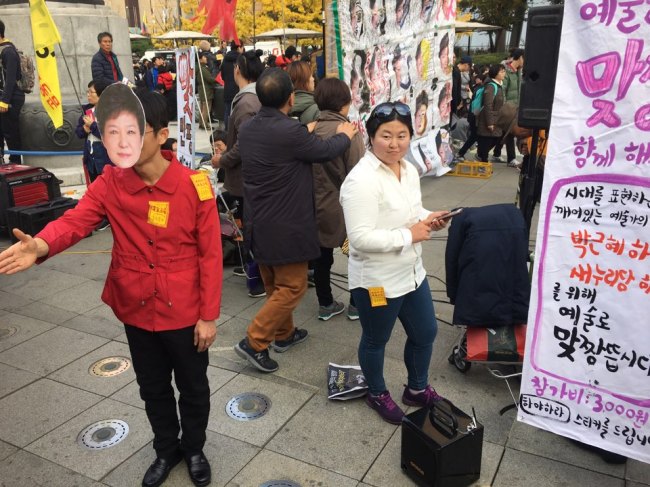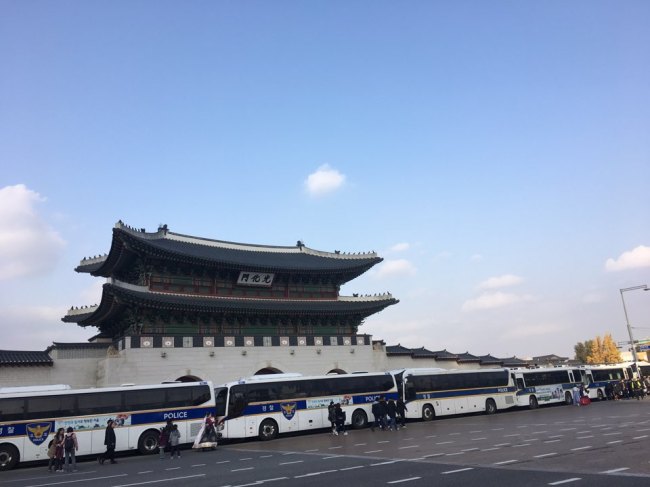[From the scene] Up to 1 million rally to demand Park’s ouster
By 조혜림Published : Nov. 12, 2016 - 23:14
In the largest anti-government rally in decades, up to 1 million South Koreans took to the streets in central Seoul on Saturday, demanding President Park Geun-hye’s resignation over a scandal involving her longtime confidante Choi Soon-sil.
From City Hall through Gwanghwamun Square to Anguk station, protestors packed the boulevards just hundreds of meters from Park’s presidential residence of Cheong Wa Dae, turning the area into a vast sea of candlelight in the evening.
Organizers said over 1 million gathered for the protest. The police estimate was 260,000.
It was the largest rally held in South Korea since the democratic uprising in June 1987, showing continuing public rage toward President Park suspected of letting her civilian friend meddle in state affairs and playing a part in extorting donations from local firms.

As of 11 p.m., thousands of protestors were still peacefully marching near Gyeongbok Palace, some 800 meters away from the presidential office, chanting “Park Geun-hye, step down!” and holding candles. Musical performances continued into the early hours on Sunday in Gwanghwamun Square.
The protest was staged in a peaceful manner despite the record high number of participants, with no major injuries or clashes reported.
Though organized by a union of some 1,500 civic groups and labor unions, the rally drew unaffiliated citizens of all ages who came with their friends and families.
Scores of protestors told The Korea Herald that they felt angry about an unelected civilian, Park’s friend Choi, “running the country behind the scenes” and that joining the rally was the least they could do to salvage the country’s democracy.
Choi Myung-ok, 44, said that she felt proud to be part of such a historic moment.
“This government has made fools of Korean citizens. We have put up with the government failing to deal with the Sewol ferry disaster, but this time I had enough of President Park Geun-hye,” said Choi, who came to the scene with her family. “I cannot feel helpless anymore. It is a chance to learn that we should better oversee those in power.”

“When my child asked me who this country’s owner was, I wanted to teach her it was us, Koreans, not a handful of powerful people,” she said. “I was not interested in politics before, but I had to come because I want my child to live in a better society.”
Kim Beom-geun, 18, was one of the many teenagers in school uniform who traveled for hours to Seoul on a chartered bus to join the rally.
“I will be eligible to vote in a couple of years. I came here to watch and learn so that I will not make such mistakes in the future,” said Kim, who came from Yeongju, North Gyeongsang Province. “Hearing all these people shouting in one voice, I feel my mind filling up.”
A 69-year-old man, who wanted to be identified only by his surname Kim, said, “I gave her a vote because I trusted her. How can she betray us like this?
“Why only powerless people should abide by law when all the powerful people break the law?”

Three opposition parties joined the rally, along with many of their presidential hopefuls.
Among them were Moon Jae-in of the Democratic Party of Korea, Ahn Cheol-soo of the People’s Party and Park Won-soon, the Seoul mayor.
“Some worry if the president steps down, there will be chaos. But the fact that she stays in her position is only making the situation worse. I demand for her to resign,” said Ahn during the rally.
Moon, former chairman of the Democratic Party, said the president had already been impeached by public sentiment, if not yet by law.
“I ask President Park to sincerely hear out the voices of thousands of people holding candles here and answer them,” he said. “If Park has any patriotism left in her, and if she still cares about the nation, she should react to heed public’s call.”
The event kicked off at 4 p.m. following a string of separate demonstrations across Seoul. The protestors’ march was peaceful and cheerful, with participants making speeches on stage and celebrities performing in front of the crowds.

“It is so fun and peaceful. I am learning again that this is democracy,” said Kang Soon-ja, a woman in her late 50s, after taking a photo with an artist dressed up as Choi Soon-sil at Gwanghwamun Square.
Various groups came out to voice their opposition to a series of policies of the Park administration, including labor market reforms, deployment of Terminal High Altitude Area Defense system and the reinstatement of state-authored history textbooks.
In several locations, right-wing civic groups and Park’s supporters held counter rallies to condemn anti-Park protestors for “plunging the country into chaos.” Calling them “North Korean sympathizers, they argued that Park’s presidency should be protected.
It was the first time that all major roads connected to central Seoul had been made open to the protestors. The police earlier imposed partial bans on several planned marches, citing traffic disruption, but the decisions were reversed by the court.
“Allowing assemblies demanding Park Geun-hye’s resignation to be held near the presidential office is a way to prove South Korea is a democratic country,” the court said in the ruling.
A series of massive anti-government rallies held last year spiraled into violence as police sought to fight off protestors with water cannons. Baek Nam-gi, 69-year-old activist farmer, died after a direct hit from a water cannon left him in a coma. This time, there were no major clashes.

Police dispatched some 25,000 officers in central Seoul to keep public order. They built barricades with police buses to surround Gyeongbok Palace in an attempt to block protestors from marching on the presidential office.
Despite Park’s two televised apologies over the scandal, personnel reshuffle in her Cabinet and proposal to relinquish some of her executive powers, South Koreans’ calls for Park’s resignation show no signs of abating.
The scandal centers on Park’s longtime friend Choi Soon-sil, who holds no government post and is accused of meddling in state affairs and personnel appointments behind the scenes.
Choi and Park’s former presidential aides are suspected of using their ties with the president to force donations from conglomerates to the Mir and K-Sports foundations which Choi allegedly set up and run for her private use.
A series of revelations increasingly implicate park in the fundraising activities. Park apologized for allowing her guard to drop with Choi Soon-sil, but distanced herself from Choi’s alleged influence-peddling and embezzlement of public funds for personal gain.
Park’s approval rating has remained at a record-low of 5 percent, setting an all-time low for any sitting South Korean president.
By Ock Hyun-ju and Jo He-rim (laeticia.ock@heraldcorp.com) (herim@heraldcorp.com)


















![[Today’s K-pop] Treasure to publish magazine for debut anniversary](http://res.heraldm.com/phpwas/restmb_idxmake.php?idx=642&simg=/content/image/2024/07/26/20240726050551_0.jpg&u=)